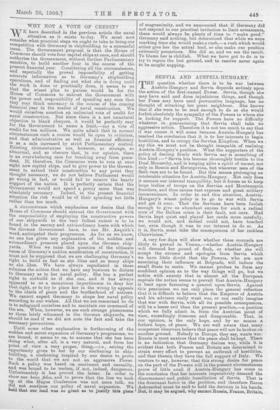WHY NOT A VOTE OF CREDIT?
-W-E have described in the previous article the naval situation as it exists to-day. We must now consider what practical steps we ought to take to bring our Fompetition with Germany in shipbuilding to a successful issue. The Government proposal is that the House of Commons should vote four capital ships at once, and should authorise the Government, without further Parliamentary sanction, to build another four in the course of the Present financial year. Considering all the circumstances, and especially the proved impossibility of getting accurate information as to Germany's shipbuilding Operations, and of finding out what she is doing until the work is done or practically done, it seems to us that the wisest plan to pursue would be for the House of Commons to entrust the Government with the power and responsibility of spending any sum that they may think necessary in the course of the coming financial year in the matter of naval construction. We would ourselves sanction an unlimited vote of credit for naval construction. But since there is a not unnatural objection to blank cheques, it would be perfectly easy for the Government to name a limit,—say a vote of credit for ten millions. We quite admit that in normal circumstances such a course would be open to criticism. and that administrative as well as financial efficiency is as a mile increased by strict Parliamentary control. Existing circumstances are, however, so strange, so abnormal, and so obscure that, in our opinion, there iS an overwhelming case for breaking away from prece- dent. If, therefore, the Commons were to vote at once eight new capital ships, and to give power to the Govern- ment to extend their construction to any point they thought necessary, we do not believe Parliament would go wrong in fact, or would fail to receive the hearty support of the nation. It is perfectly certain that the Government would not spend a penny more than was absolutely necessary. Indeed, in the present fivancial situation the risk would be of their spendiug too little rather than too much.
A circumstance which emphasises our desire that the 'Tense of Commons should entrust the Government with the responsibility of employing the constructive powers of our shipyards to the very fullest extent is to be found in the secrecy and extraordinary haste with which the German Government have, to use Mr. Asquith's 'word, anticipated their programme. As far as we know, no one has given any explanation of the sudden and extraordinary pressure placed upon the German ship- yards. When we raise this question of the ultimate cause of Germany's sudden acceleration of construction, it must not be supposed that we are challenging Germany's right to build as fast as she likes and as many ships as she likes. We have always repudiated in these columns the notion that we have any business to dictate to Germany as to her naval policy. She has a perfect right to outbuild us if she can, and it has always appeared to us a monstrous impertinence to deny her that right, or to try to place her in the wrong by appeals to the ideals of peace and the brotherhood of nations. We cannot expect Germany to shape her naval policy according to our wishes. All that we are concerned to do is to safeguard ourselves and to maintain our command of the sea. When, however, we see such strange phenomena as those lately witnessed in the German shipyards, we Should be mad if we did not note the fact and take the necessary precautions.
Until some other explanation is forthcoming of the sudden and secret expansion of Germany's programme, we are bound, it seems to us, to assume that she has been doing what, after all, is a very natural, and from her point of view a very proper, thing,—i.e., seizing the Opportunity given to her by our slackening in ship- building, a slackening inspired by our desire to prove to the world that we are not an aggressive Power. Such a policy was based on sentiment and unreality, and was bound to be useless, if not, indeed, dangerous. Unfortunately it has proved the latter. In order to show our bona fides, and to prove that the line we took Up at the Hague Conference was not mere talk, we did not continue our policy of naval expansion. We held that our lead was so great as to justify this piece of magnanimity, and we announced that if Germany did not respond to our practical invitation to limit armaments, there would always be plenty of time to "make good." Germany said nothing, but determined that while we were marking time she would make a rush,—a rush which would either give her the actual lead, or else make our position extremely precarious. She did so, and we see the result. To blame her is childish. What we have got to do is to try to regain the lost ground, and to resolve never again to be caught napping.










































 Previous page
Previous page